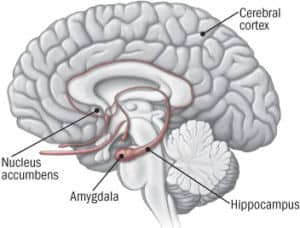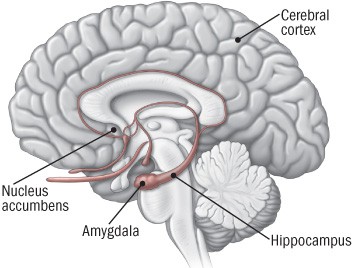If you are old enough, you might remember the old public service commercial about a frying egg representing “your brain on drugs.” I doubt that people actually avoided drugs based upon that commercial, but it did get our attention! What about your brain on smartphones? Admittedly, that’s a drastic comparison, but they do share some common qualities. Smartphone addiction can occur for the same reasons that drugs can be addictive. So, let’s dive into a little comparison!
Smartphone Addiction and the Brain
 I did a series of blogs, starting with this one on classical conditioning, on how technology can “hook” us into compulsively checking our devices. This can appear to be a smartphone addiction. Interestingly, many behavioral addictions, such a gambling, appear to tap into the same reward areas of the brain that are involved in addictive drugs. These are “older” parts of the brain that are associated with feelings of pleasure but are also important to reward learning. This includes a cluster of neurons called the nucleus accumbens that releases dopamine, a neurotransmitter, when the reward system is activated.
I did a series of blogs, starting with this one on classical conditioning, on how technology can “hook” us into compulsively checking our devices. This can appear to be a smartphone addiction. Interestingly, many behavioral addictions, such a gambling, appear to tap into the same reward areas of the brain that are involved in addictive drugs. These are “older” parts of the brain that are associated with feelings of pleasure but are also important to reward learning. This includes a cluster of neurons called the nucleus accumbens that releases dopamine, a neurotransmitter, when the reward system is activated.
Certainly, there’s much more to addiction that just the stimulation of certain brain regions and the release of dopamine. However, it appears that behavioral addictions, which can include compulsive smartphone checking, work in a manner that is similar to that of addictive drugs. Now, checking Snapchat isn’t going to give a teen the same level of dopamine burst that they would get from snorting cocaine. Thank goodness or we’d all be in a LOT of trouble!
Wanting Versus Liking
Instead of feeling pleasure at checking our devices, the activation of the dopamine system creates, in a manner of speaking, an itch that needs to be scratched. Importantly, this reward system is activated at the mere presence of our cell phones and especially when they buzz, ring, or chime. Thus, when we are in a state of anticipation, the reward system is activated and dopamine is released. My phone buzzed. Who might be texting me? What might they want? I wonder who liked my post on Facebook? Who might have commented and what might they have said?
You might notice that feeling yourself. What does it feel like when your smartphone phone buzzes or chimes while in your purse or pocket? What’s the feeling that arises? It’s not exactly pleasure. But we do feel something. It’s that itch that needs to be scratched. In the case of our smartphones, it means we check them. Often, it is easier to give into the feeling and check our devices than to fight that feeling. Checking feels like…relief from that itch!
Everywhere We Go
It is particularly tempting to check our smartphones because we basically carry them with us wherever we go. We have all seen people, or sometimes we’ve been that person, who has his or her head down with eyes glued to the smartphone while:
- Walking across the street or in a parking lot
- Riding a bike
- At a concert or sporting event
- Pushing an infant or toddler in a stroller
- Waiting at the airport or in any line
- At restaurants
- In the bathroom
- In a sauna
- While driving
Let’s be careful not to judge too harshly. We have all done some of these things from time to time. Given the pull our phones have, it’s hard to fight the compulsion to check them. Since they are always on us, it makes it even more difficult. Then there’s the fact that they are pinging or vibrating. Imagine if a drug user always had a stash on them, they could get away with using almost any time, AND the drug alerted them and asked to be used! It’s no wonder why we can’t “just say no” to our phones!
Are Tech Companies Like Big Tobacco?
Here’s another factor that makes it difficult to fight our compulsion to use our phones. Tech companies, like Facebook, Google, and Snapchat, make their money based on people using their products. Basically, they want eyes on their app or program because that’s how they make money. The more we use their technology, the more money they make. Our attention is a precious commodity that they fight hard to gain. They know all about the hooks of technology and hire neuroscientists, psychologists, and behavior experts to devise ways to keep us hooked. Just take a look at industry insider Nir Eyal’s Hooked: How to Build Habit-Forming Products. The title says it all! Just like Big Tobacco wants people to get hooked on cigarettes, the tech industry wants us hooked on their products. They want us to develop a smartphone addiction. They don’t care for our overall well-being. That’s not their mission. Their goal is to sell their products and make money. That’s capitalism at work!
The Takeaway?
Technologies such as smartphones, texting, email, gaming, and social media can lead us to compulsively check our devices. They activate the same reward circuits in the brain that are involved in drug addiction. So, in this sense, we can have a smartphone addiction. Importantly, we feel motivated to check our devices because they create a feeling of wanting, not necessarily liking. When we are in a state of anticipation, the dopamine reward system is activated. We feel compelled to check. Tech companies understand these mechanisms quite well and use them to get us hooked. That’s how they make their money. They don’t really care if our well-being and productivity take a hit. As long as they have our eyes, they profit. That doesn’t necessarily make tech companies bad. But it should give us all pause because their goal (to get our attention so they can make money) doesn’t align with ours (ultimately, to meet our needs, be productive, be happy).

